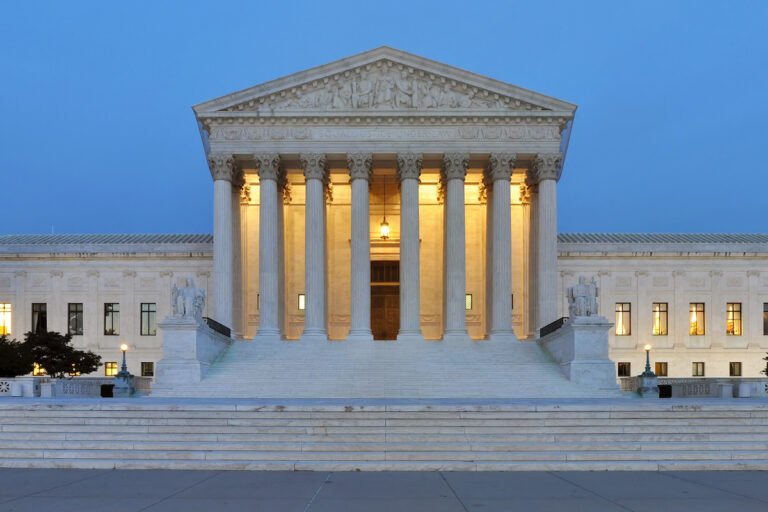The future of many federal rules designed to protect public health and safeguard patients from industry abuses is uncertain, the result of conservative-led court decisions that have weakened regulators’ powers.
The series of rulings could expand judges’ power to question the decisions of federal scientists and other government experts, undermining the authority of agencies such as the Food and Drug Administration (FDA), the Centers for Medicare and Medicaid Services (CMS) and the Environmental Protection Agency (EPA).
Given this new legal landscape, journalists may need to consider asking lawmakers, regulators and regulated entities about the potential impact of court challenges when reporting on both new and existing regulations.
Here’s what experts have to say about two recent cases, one that has already been decided and one that is still before the courts:
Chevron’s loss of respect will have far-reaching effects
Many health care regulations are at risk after the Supreme Court’s surprising decision to overturn the Chevron doctrine, a decades-old precedent that requires judges to defer to expert bodies’ reasonable interpretations of unclear laws.
While the case in question involved fishing, legal experts say the decision could set off a surge in lawsuits challenging government regulations related to public health and health care. In a separate decision, the Supreme Court extended the deadline for suing federal agencies, opening the door to more challenges to federal regulations.
Federal agencies are expected to become more careful and detailed in their rulemaking to fend off industry challenges, former CMS Deputy Commissioner Cindy Mann, J.D., noted on a recent KFF Health Wonk Shop appearance.
The decision also will make it more difficult for Congress to craft legislation, said Dean Rosen, a former chief medical adviser to former Senate Majority Leader Bill Frist, adding that lawmakers often leave laws intentionally vague for political and practical reasons.
Speakers at the KFF forum expressed concern that the new legal environment will hinder the government’s ability to respond nimbly amid industry changes and the public health emergency.
Law firm Baker Donelson has listed the following potential hotbeds of lawsuits against the federal government:
- Medicare reimbursements.
- Medicare and Medicaid coverage.
- Medicare and Medicaid Administration.
- Affordable Care Act (ACA) non-discrimination requirements.
- FDA oversight of food, drugs, and medical devices.
- Social Security and Disability Benefits.
- health care fraud and misconduct laws, such as the anti-kickback statute;
- Nursing care certification.
The ruling could pave the way for new industry challenges to federal measures such as Medicare drug price negotiations, surprise medical billing rules, preventive health services under the ACA, pandemic-related public health measures, and patient privacy protections under the Health Insurance Portability and Accountability Act.
Here are some examples of what’s at risk:
Braidwood Case Threatens Coverage of Preventive Care Services
The ruling from the ultra-conservative 5th Circuit Court of Appeals puts the ACA’s preventive services coverage requirements and preventive health care for millions of Americans at risk, according to attorney Richard Hughes, who wrote about the case for Health Affairs magazine.
The ruling upheld a lower court ruling that found the U.S. Preventive Services Task Force’s role in determining mandatory preventive coverage under the ACA was unconstitutional. Under the ACA’s mandatory coverage requirements, nearly all health insurers must cover a large number of preventive care services without the payment of deductibles, copayments, or coinsurance premiums.
One of the plaintiffs in the suit, Braidwood Management, is a Christian-owned business that is challenging the requirement that most health insurers and employers provide certain preventive health services at no cost to patients. The defendant is U.S. Secretary of Health and Human Services Xavier Becerra.
As AHCJ has previously explained in reporting, at issue is whether the 150 million people who have private health insurance through their employers and the roughly 80 million Americans who are enrolled in Medicare and Medicaid will continue to be able to get preventive care without incurring out-of-pocket costs.
The 5th Circuit judges wrote in their decision that their decision to send the case back to a lower court was “mixed.” As Hughes, a partner at Epstein, Becker & Green and a lecturer at George Washington University Law School, explained, the appeals court blocked a nationwide injunction against the ACA mandates, meaning parts of the law are safe for now.
But plaintiffs may seek other paths to repeal the mandate nationwide, and a future ruling, as discussed in this article, could affect insurance coverage for disease testing, vaccines, contraceptives, and pre-exposure prophylaxis (PrEP) medications, which are effective in preventing HIV infection.
The lawsuit does not address the roles of two other agencies entrusted by Congress with policy guidance on coverage of preventive services: the Advisory Committee on Immunization Practices (ACIP), which is responsible for vaccines and immunizations, and the Health Resources and Services Administration (HRSA), which is responsible for preventive services and testing for children and women.
But the 5th Circuit’s decision “provides new legal ammunition to undermine them,” Hughes wrote.


